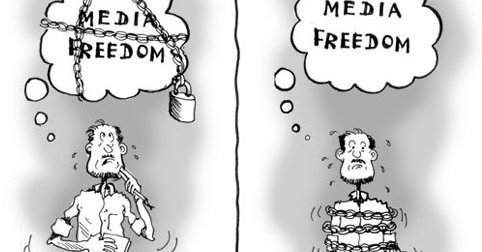The European Commission has recently released reports on the EU candidates’ status in regard to the necessary EU standards established by the treaties prior to EU accession. Two out three candidate states (Turkey and Croatia) and the ’potential candidates’ (Bosnia-Herzegovina, Albania, Macedonia, Serbia, Kosovo and Montenegro) are far from realising the standard for EU media freedom. Only Iceland is on the right path. This situation is a serious risk undermining their accession to the EU.
The worst situation may be found in Turkey as a result of the ’high number of violation to the media and expression freedom, civil sues against journalists and the black out of Internet web site’ reported by the Commission. It must be said that even Youtube was taken off the air for two years untill last October. The European Federation of Journalists reports that almost 40 journalists are still in jail ’because of doing their job honestly and professionally’. Furthermore, there is also the unsolved anti Semitism issue in the media, as Turkey is mostly Muslim.
If you look at the Balkan region the situation looks even worse due to ongoing post war and ethnic conflicts. Bosnia-Herzegovina is still far from implementing the ’Freedom of Access to Information Act’ as it would have to make public the information that authorities have kept secret for too many years. In the last year, the situation has been worsening according to the Freedom House’s 2009 media freedom ranking which moved Bosnia from the 47th place to the 98th. Too often politics take over information issues, the Commission reports. The South East Europe Organisation refers to the TV channel Alternativna Televizija that receives strict instructions about what to report during the last month of the 2009 electoral campaign. Then, Fahrudin Radoncic, leader of a political party and editor in chief of the main Bosnian newspaper, publicly addressed a critical journalist with racist and sexual discriminating insults.
Kosovo is also sailing in deep water. After its independence in February 2008, the deputy Prime Minister is still holding the main public TV broadcasting. The Commission reports also that political authorities control the advertisement market which affects the media sector. Moreover, media ownership is a source of worries also in Albania and Macedonia, the Commission reports. Beyond the ’name dispute’ between Macedonia and Greece, journalists are still threatened. At the same time Roma minorities are discriminated against after the massive Roma expulsion from France last September.
Media freedom is at stake.
Serbia is under fire. After the attempted murder of Dejan Anastasijevic, the reporter who had investigated Slobodan Milosevic’s war crimes, the number of violence against journalists rose steadily with no serious investigative follow-up. Nevertheless, the freedom of the press is at stake not only in the candidate states. Even in the EU many national governments are seriously threatening the independence of reporting. The Freedom House has declared three EU countries without entirely ‘free media’: Italy, Romania and Bulgaria. Furthermore, other countries, such as France, are steadily moving backwards in such rankings.
While the Enlargement Commissioner Štefan Füle is optimistic with regard to the improvements made by the candidate states, the EU is facing a step backwards inside its own borders. More than once, common standards on the freedom of the press have been refused by the European Parliament while the Commission has repeatedly asked to start negotiating a directive on Media pluralism. It’s difficult to get a majority as national governments are lobbying for the EU to keep out of their national affairs.
Once again the freedom of the press is likely to become a battle field inside and outside the EU.


Follow the comments: |
|
